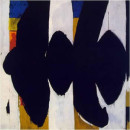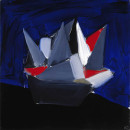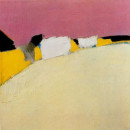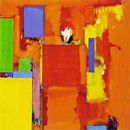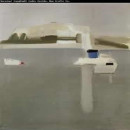4 Poets from Poetry Salzburg Review
Poetry Salzburg Review was founded in 2001, and now gives a generous selection of poems (from some 50-60 poets), essays, translations and reviews. The policy is not now as advertised:The editorial policy is catholic – David Miller, a member of our Editorial Board from No.1 to No. 18 summarised our beliefs in the following way: “[We] wish to highlight and promote those poets and poetic writers whose work [we] find challenging, singular, exciting – whatever, if any, their allegiances may be.” Present-day poetry would do well to recur to poetry as rhythmic structure and patters of sound instead of chatting along amiably in what is only nominally verse. The experience of poetry as sound demands craftsmanship, a training in rhythm, metre, and phonology (the colour of Rimbaud’s vowels!), something to be recommended to young poets if they want their...
Read MoreSix Poets in Poetry London
Poetry London bills itself as ‘one of the very few, essential poetry magazines in English’, where ‘newer authors share pages with acclaimed contemporary poets.’ The magazine is published three times a year, contains comprehensive poetry listings, and has ‘featured new poems by such distinguished contemporary poets as Alice Oswald, Sean O’Brien, Ciaron Carson and Pauline Stainer, and reviews of work by John Burnside and Mimi Khalvati.’ Only one year is represented by the Poetry Library London’s selection, and many poems are not on line for copyright reasons. Nonetheless, with all excuses made, the obvious has to be said: work by the big names is generally dull, if not downright tiresome, and the poetry of the others, the newcomers, doesn’t usually earn its line length: i.e. it’s often spun out, prosy, and verging on the pedestrian. Two problems seem general....
Read More10 Poets in Poetry Cornwall
The 2009-2010 editions of Poetry Cornwall yield a fine crop of poems to commend to discriminating readers. Yes, this is local fare with all that the label implies – the simple, honest and homespun, generally unaware of international trends, or even of Modernism itself. Free verse predominates, but there’s more than a sprinkling of rhymed verse. Indeed, technically the most accomplished poem – Abigail Wyatt’s Mite – would not be out of place in a nineteenth-century publication. And if the local scenes are described with the loving attention to detail we find in amateur art society shows, they are none the worse for that. True, the really original, and that panache of the professional’s touch are absent, but so too is the mindless adoption of contemporary styles and themes that make the poetry of more prestigious journals such depressing...
Read More4 Poets in Magma
Magma is a go-ahead poetry magazine that chooses a different editor for each of its thrice yearly issues. It is generally represented at the Ledbury Poetry Festival, and launches its poets at the Troubadour Coffee House in Old Brompton Road, London SW5. There are generous review sections and, like many others in the UK, the magazine receives funding from the Arts Council. The issues put on line by the Poetry Library date from 2005-6, and include many poems not displayed for copyright reasons. Most of the work, I fear, is closer to prose, and not very interesting prose either, but I’ve picked four examples that offer something better. The first is In Praise of Land Drains by Jane Routh, who modestly describes herself as managing a woodland and keeping a flock of geese. The poem is at: http://www.poetrymagazines.org.uk/magazine/record.asp?id=24824 It’s...
Read More5 Poets in Iota
Iota is published three times a year, and is now in its third decade of publication. The editorial team is based at the University of Gloucestershire, and all submissions are read anonymously. Submissions are invited from around the world, and there is the customary international poetry competition. Many of the poets featured have won local or national awards, and the magazine has interviews that place the contributors’ work in context. Generous space is also given to reviews of recent poetry collections: a most welcome feature. It may seem churlish to ignore work by poets winning prestigious prizes, but I have chosen a few poems here that appeal more – probably because they’re intelligently structured – and passed over a good many others by better-known names that seem rather flat and predictable. Iota is no doubt improving, and now attracting the...
Read MoreThe Rhapsodic Fallacy
I’ve been reading, or at least dipping into, Twentieth-Century American Poetics: Poets on the Art of Poetry (McGraw-Hill, 2004), a collection of some 53 essays or articles edited by Dana Gioia, David Mason and Meg Schoerke. The range is from James Weldon Johnson (1871-1938) to Christian Wiman (1966-), and includes many illustrious names. The contributions seem sensibly chosen, moreover, and the book deserves a proper review in due course. My concern here is an essay entitled The Rhapsodic Fallacy by Mary Kinzie and published in the fall 1984 issue of Salmagundi. The theme generated a good deal of discussion, and Mary Kinzie later expanded the ideas into a full-length book: The Cure of Poetry in an Age of Prose. {1} Kinzie makes no bones about the fallen state of contemporary poetry, even thirty years ago. The essay opens: Contemporary...
Read More6 Poets in The Interpreter’s House
The Interpreter’s House has been going for close on twenty years now, by no means making it an old-timer but still something commendable, requiring time, energy and commitment. The venture started life in 1996 as a Bedfordshire magazine, and indeed the title comes from ‘Pilgrim’s Progress’ – ‘the house of the Interpreter; at whose door he should knock; and he would show him excellent things’. The editor Merryn Williams looks for “the union of simplicity and mystery which makes writing memorable” The editor goes on to say: We’ve included some extremely distinguished poets (Dannie Abse, Alan Brownjohn, David Constantine, Sophie Hannah, Sheenagh Pugh, Carole Satyamurti, Vernon Scannell, R.S. Thomas), and work first published in THE INTERPRETER’S HOUSE has appeared in the last three Forward Books of Poetry. And: I believe that modern poetry has drifted dangerously far from the...
Read MoreThe Frogmore Papers
The Frogmore Papers is a long-standing literary journal, founded in 1983 and now edited by Jeremy Page, Mary Hetherington and Catherine Smith. There is the usual mix of established writers and newcomers, but the advice given in the literary journal does indeed apply: . . . the only criterion for selection being quality. However, it’s worth noting that the following are unlikely to be find favour: very long stories, very long poems, poems written in an idiom that is anything other than contemporary, poems that try too hard. That last phrase is worth emphasizing. The published work is certainly in a contemporary voice, with no hint of metre or rhyme to interrupt the poised, flexible and intelligent tone, but sometimes so light-weight and reticent in content as to be scarcely saying anything at all. The London Poetry Society Library...
Read More5 Poets in Chroma Magazine
Chroma, a literary magazine devoted to by lesbian, gay, bisexual and transgender writers and artists published 11 issues between 2004 and July 2010. It enjoyed the support of the Arts Council, England, and three issues have been placed online by the Southbank Poetry Library. The editors when the magazine closed were Shaun Levin and Saradha Soobrayen. The former said, ‘We want each issue to be exciting in its diversity of voices and the wide range of art work we include. If you want to be part of the mainstream, we’re probably not the journal for you. We want writers who take risks in their work, who experiment, and still tell a story beautifully.’ Half the work in the three issues is unavailable online but, to judge by the remainder, the poetry is in free verse form, or more strictly...
Read More6 Poets in The Cannon’s Mouth
The Cannon’s Mouth is the quarterly journal of the Cannon Poets, a local group of poets that meets every month in the Post Office Building of Moseley in Birmingham. Anyone who attends such groups in England will recognize the work as typical of poets who have a day job and/or family to support. It’s straightforward, friendly and unpretentious. Not much would be published by the more serious and prestigious magazines, I suspect, but there are several accomplished pieces and more that simply need time and thought to be worked up properly. About half the work is ‘restricted access’, i.e. readers can consult the magazine in the Poetry Library but the authors have not given permission for Internet access, though why is a mystery, since the greatest problem facing contemporary poets is not having their work stolen but finding a readership...
Read More6 Poets in Candelabrum Poetry Magazine
Candelabrum Poetry Magazine has been going since 1970, consistently providing a much-needed platform for traditional verse, quality free verse and short forms like the haiku and tanka. The magazine appears twice a year, and its editor is still M. L. McCarthy. The website is here: http://www.members.tripod.com/redcandlepress/Magazine.htm Most of the work here is competently turned, though not generally breaking new ground. The problems are those of any art form that measures itself against the achievements of the past: borrowings, an uncontemporary diction at times, and vacuity when the rhymed container exceeds the content. There is more to writing traditional verse than getting it to scan and rhyme, and the pieces chosen here have that added naturalness that seems artless but is usually the result of long practice and repeated polishing. The poems are taken from the Poetry Library’s 2006-7 online...
Read More6 Haiku Poets in Blithe Spirit
Blithe Spirit is that most estimable of things, the unpretentious poetry magazine that has quietly served its small readership year after year with poems, articles and discussions. Blithe Spirit is the Journal of the British Haiku Society, but with haiku are included senryu, tanka, haibun and renku. The Journal first appeared in 1991 and is now 64 page publication with a circulation around 300. I am not sure haiku, or any of the condensed eastern forms, really works in English, or – to put matters another way – convinced that the syllable restriction is a sufficient basis for poetry of any substance. Other verse techniques – rhythm, sound pattering, rhyme – would seem equally important, but its devotees obviously see matters differently. The poems are too short to select lines from, and to showcase the work I have had...
Read More

